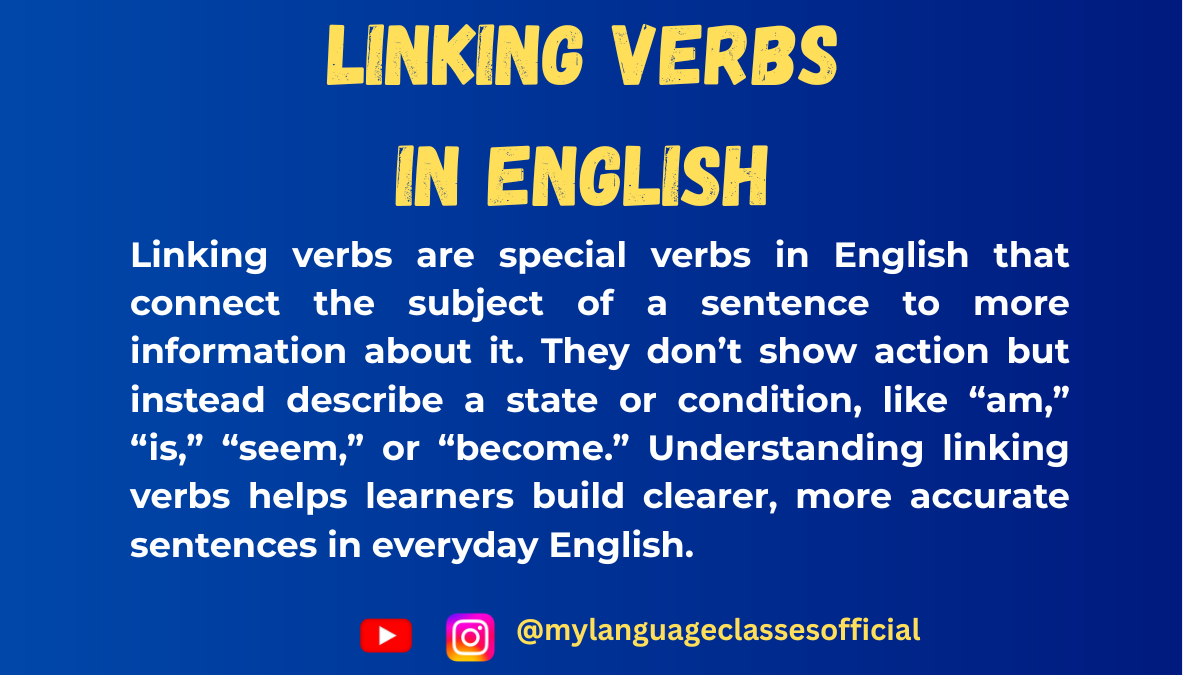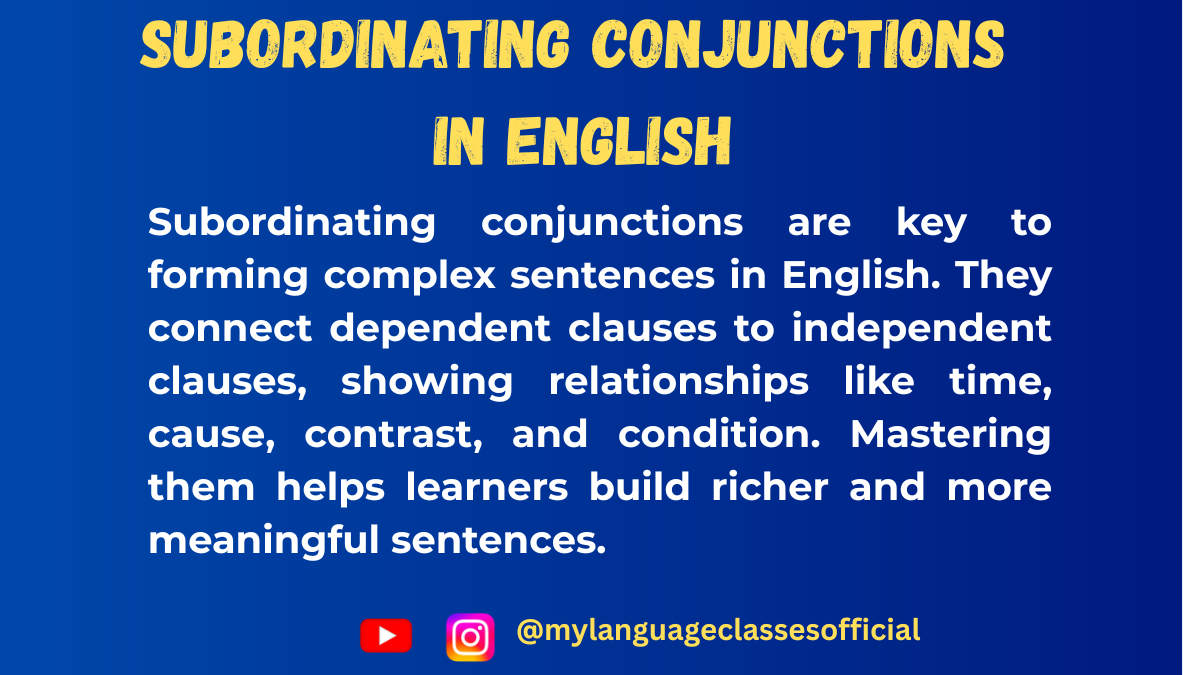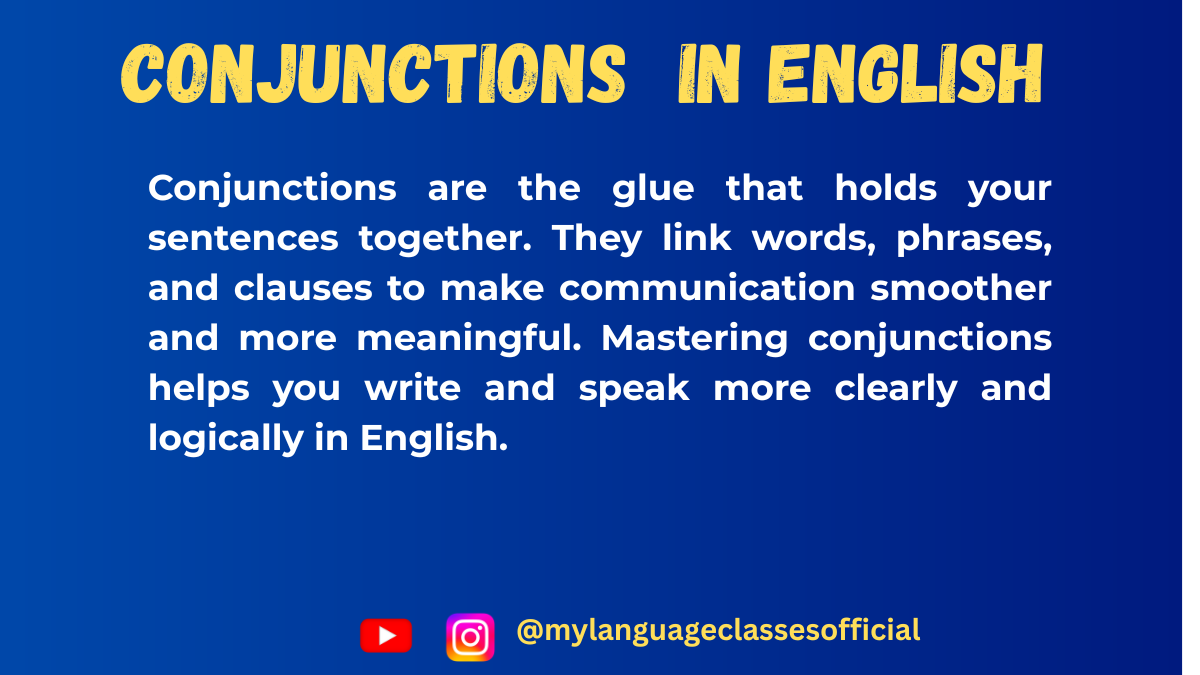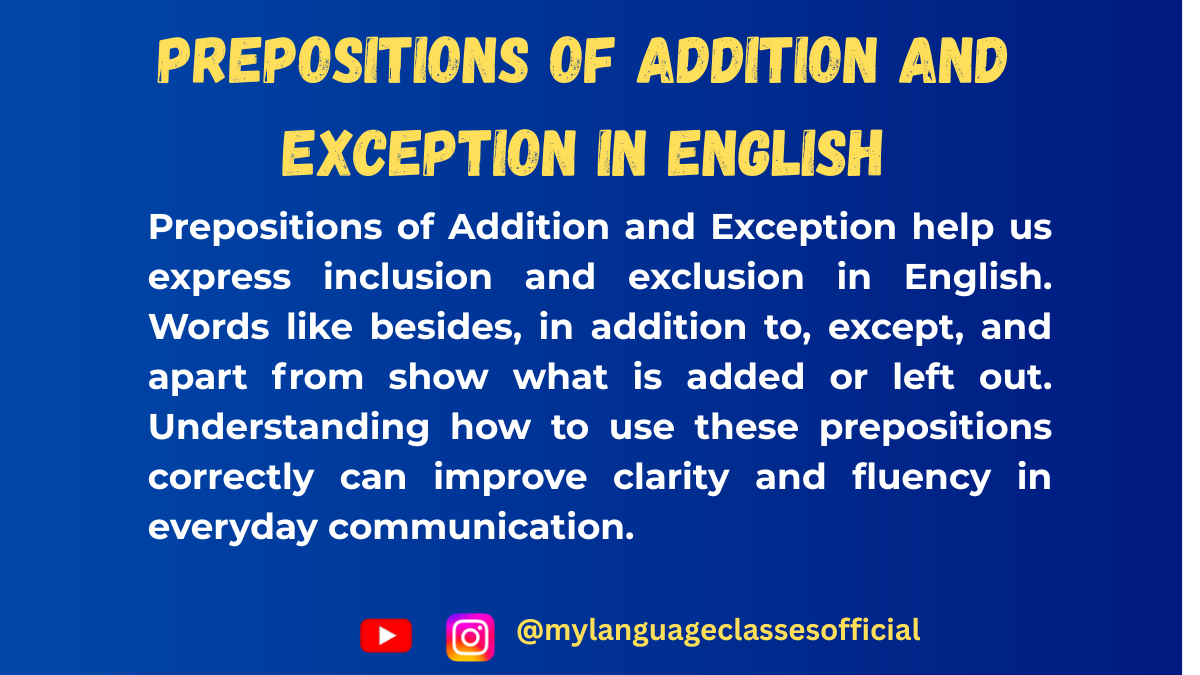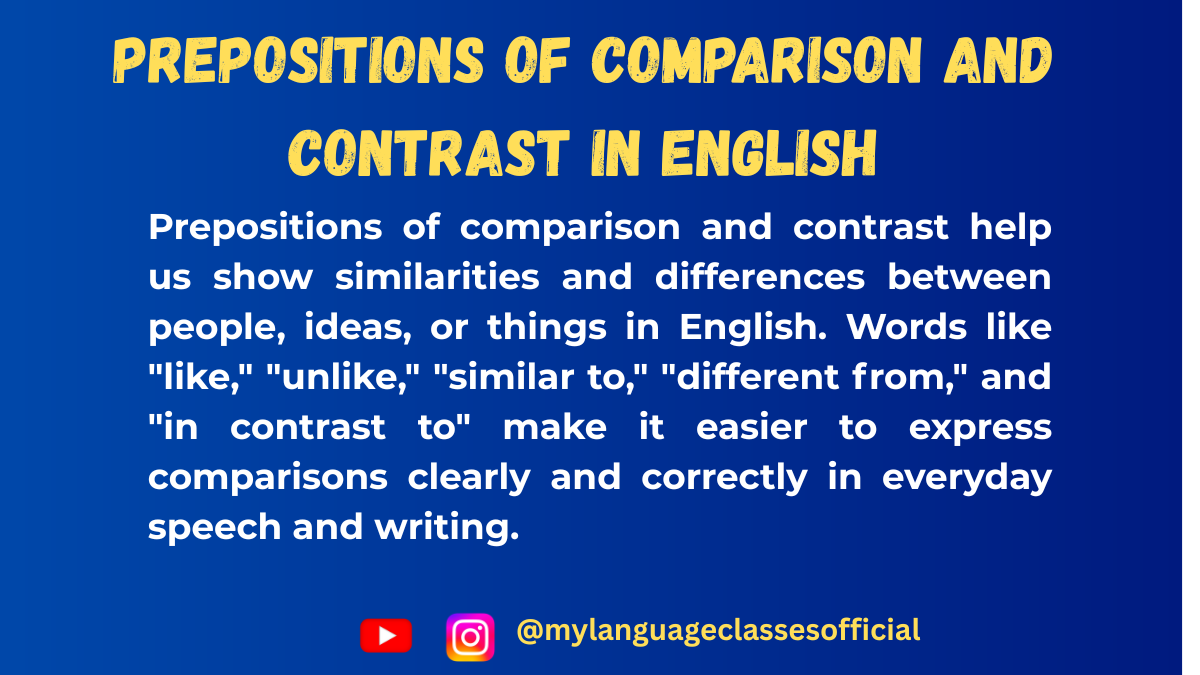Your cart is currently empty!
Tag: IELTS
-
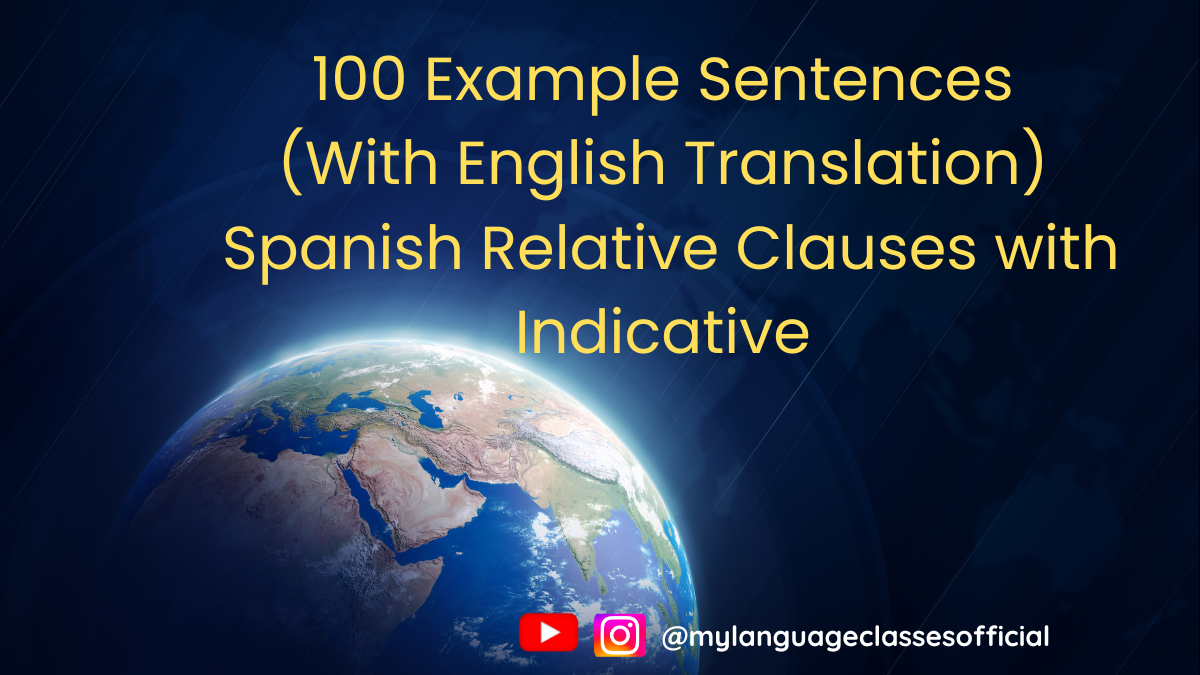
100 Example Sentences of Relative Clauses (Oraciones relativos) with Indicative in Spanish | My Language Classes
Relative Clauses (Oraciones relativos) with Indicative
Relative clauses, or oraciones relativos, are a fundamental part of Spanish grammar. They allow us to add extra information about a noun without starting a new sentence. When combined with the indicative mood, these clauses express factual or certain information. To help you master this concept, we’ve compiled 100 example sentences of relative clauses with the indicative in Spanish. These examples cover a wide range of everyday situations, making them perfect for practice and reference. Let’s dive in!
100 Example Sentences of Relative Clauses with Indicative
- El libro que leí es fascinante. (The book I read is fascinating.)
- La persona que me ayudó es muy amable. (The person who helped me is very kind.)
- El lugar donde vivimos es tranquilo. (The place where we live is peaceful.)
- El día que nos conocimos fue especial. (The day we met was special.)
- La razón por la que vine es importante. (The reason why I came is important.)
- Las cosas que me gustan son simples. (The things I like are simple.)
- El chico que sabe mucho es mi hermano. (The boy who knows a lot is my brother.)
- La casa que compramos es grande. (The house we bought is big.)
- El momento en que llegó fue inesperado. (The moment he/she arrived was unexpected.)
- La comida que preparé es saludable. (The food I prepared is healthy.)
- El coche que conduzco es nuevo. (The car I drive is new.)
- La película que vimos fue emocionante. (The movie we watched was exciting.)
- El profesor que enseña español es muy bueno. (The teacher who teaches Spanish is very good.)
- La ciudad donde nací es hermosa. (The city where I was born is beautiful.)
- El regalo que recibí es perfecto. (The gift I received is perfect.)
- Las flores que compraste son hermosas. (The flowers you bought are beautiful.)
- El niño que juega en el parque es mi hijo. (The boy who plays in the park is my son.)
- La música que escucho es relajante. (The music I listen to is relaxing.)
- El restaurante que recomendaste es excelente. (The restaurant you recommended is excellent.)
- La persona que llamó es mi jefe. (The person who called is my boss.)
- El libro que escribió es famoso. (The book he/she wrote is famous.)
- La playa donde nadamos es tranquila. (The beach where we swim is peaceful.)
- El día que llegaste fue inolvidable. (The day you arrived was unforgettable.)
- La razón por la que estudias es admirable. (The reason why you study is admirable.)
- Las canciones que cantamos son divertidas. (The songs we sing are fun.)
- El hombre que habla es mi profesor. (The man who is speaking is my teacher.)
- La mujer que cocina es mi madre. (The woman who cooks is my mother.)
- El perro que ladra es de mi vecino. (The dog that is barking is my neighbor’s.)
- La casa que construyeron es enorme. (The house they built is huge.)
- El café que tomamos es delicioso. (The coffee we drank is delicious.)
- El chico que corre rápido ganó la carrera. (The boy who runs fast won the race.)
- La película que vimos ayer fue aburrida. (The movie we watched yesterday was boring.)
- El lugar donde nos encontramos es muy popular. (The place where we met is very popular.)
- El libro que estoy leyendo es interesante. (The book I’m reading is interesting.)
- La persona que me llamó es mi mejor amigo. (The person who called me is my best friend.)
- El coche que compraste es muy rápido. (The car you bought is very fast.)
- La comida que pedimos estaba fría. (The food we ordered was cold.)
- El niño que estudia mucho es muy inteligente. (The boy who studies a lot is very smart.)
- La ciudad que visitamos es muy antigua. (The city we visited is very old.)
- El momento en que nos conocimos fue mágico. (The moment we met was magical.)
- El libro que me prestaste es increíble. (The book you lent me is amazing.)
- La persona que canta es mi hermana. (The person who is singing is my sister.)
- El lugar donde trabajamos es muy moderno. (The place where we work is very modern.)
- El día que llegamos fue lluvioso. (The day we arrived was rainy.)
- La razón por la que no vine es el tráfico. (The reason I didn’t come is the traffic.)
- Las cosas que compramos son útiles. (The things we bought are useful.)
- El chico que juega fútbol es mi primo. (The boy who plays soccer is my cousin.)
- La casa que alquilamos es pequeña. (The house we rented is small.)
- El momento en que ganamos fue emocionante. (The moment we won was exciting.)
- La comida que preparaste está deliciosa. (The food you prepared is delicious.)
- El coche que vendimos era viejo. (The car we sold was old.)
- La película que recomendaste es muy buena. (The movie you recommended is very good.)
- El profesor que nos enseñó es muy sabio. (The teacher who taught us is very wise.)
- La ciudad donde crecí es muy pequeña. (The city where I grew up is very small.)
- El regalo que hiciste es muy especial. (The gift you made is very special.)
- Las flores que plantamos están creciendo. (The flowers we planted are growing.)
- El niño que dibuja es muy talentoso. (The boy who draws is very talented.)
- La música que tocamos es clásica. (The music we play is classical.)
- El restaurante que elegimos es caro. (The restaurant we chose is expensive.)
- La persona que me escribió es mi amiga. (The person who wrote to me is my friend.)
- El libro que leíste es muy interesante. (The book you read is very interesting.)
- La playa donde descansamos es hermosa. (The beach where we rested is beautiful.)
- El día que nos casamos fue perfecto. (The day we got married was perfect.)
- La razón por la que trabajas es importante. (The reason why you work is important.)
- Las canciones que escuchamos son románticas. (The songs we listen to are romantic.)
- El hombre que corre es mi vecino. (The man who is running is my neighbor.)
- La mujer que pinta es muy talentosa. (The woman who paints is very talented.)
- El perro que adoptamos es muy cariñoso. (The dog we adopted is very affectionate.)
- La casa que diseñamos es única. (The house we designed is unique.)
- El café que bebimos es fuerte. (The coffee we drank is strong.)
- El chico que estudia medicina es mi amigo. (The boy who studies medicine is my friend.)
- La película que vimos anoche fue divertida. (The movie we watched last night was fun.)
- El lugar donde cenamos es muy acogedor. (The place where we had dinner is very cozy.)
- El libro que compré es muy educativo. (The book I bought is very educational.)
- La persona que me espera es mi novia. (The person waiting for me is my girlfriend.)
- El coche que manejas es muy moderno. (The car you drive is very modern.)
- La comida que cocinaste es exquisita. (The food you cooked is exquisite.)
- El niño que lee mucho es muy listo. (The boy who reads a lot is very clever.)
- La ciudad que exploramos es fascinante. (The city we explored is fascinating.)
- El momento en que nos graduamos fue emotivo. (The moment we graduated was emotional.)
- El libro que me regalaste es muy útil. (The book you gave me is very useful.)
- La persona que baila es mi prima. (The person who is dancing is my cousin.)
- El lugar donde nos relajamos es tranquilo. (The place where we relax is peaceful.)
- El día que viajamos fue soleado. (The day we traveled was sunny.)
- La razón por la que luchas es admirable. (The reason why you fight is admirable.)
- Las cosas que aprendimos son valiosas. (The things we learned are valuable.)
- El chico que juega baloncesto es mi compañero. (The boy who plays basketball is my teammate.)
- La casa que construimos es ecológica. (The house we built is eco-friendly.)
- El momento en que ganamos fue inolvidable. (The moment we won was unforgettable.)
- La comida que probamos fue picante. (The food we tried was spicy.)
- El coche que arreglamos funciona bien. (The car we fixed works well.)
- La película que disfrutamos fue emocionante. (The movie we enjoyed was exciting.)
- El profesor que nos guió es muy paciente. (The teacher who guided us is very patient.)
- La ciudad donde nos conocimos es muy animada. (The city where we met is very lively.)
- El regalo que recibimos fue sorprendente. (The gift we received was surprising.)
- Las flores que cortamos son frescas. (The flowers we cut are fresh.)
- El niño que canta es muy talentoso. (The boy who sings is very talented.)
- La música que escuchamos es alegre. (The music we listen to is cheerful.)
- El restaurante que visitamos es muy famoso. (The restaurant we visited is very famous.)
- La persona que me inspiró es mi abuela. (The person who inspired me is my grandmother.)
Conclusion
These 100 example sentences of relative clauses with the indicative in Spanish are designed to help you understand and practice this important grammar concept. By studying these examples, you’ll gain confidence in constructing your own sentences and using relative clauses naturally in conversations. Keep practicing, and soon you’ll master this essential part of Spanish grammar. ¡Buena suerte! (Good luck!)
If you found this guide helpful, I’d love to hear from you! Share your thoughts in the comments below or connect with me on social media. For more tips, resources, and inspiration, visit my blog at mylanguageclassesblog.wordpress.com. Follow on Instagram and subscribe on YouTube
-
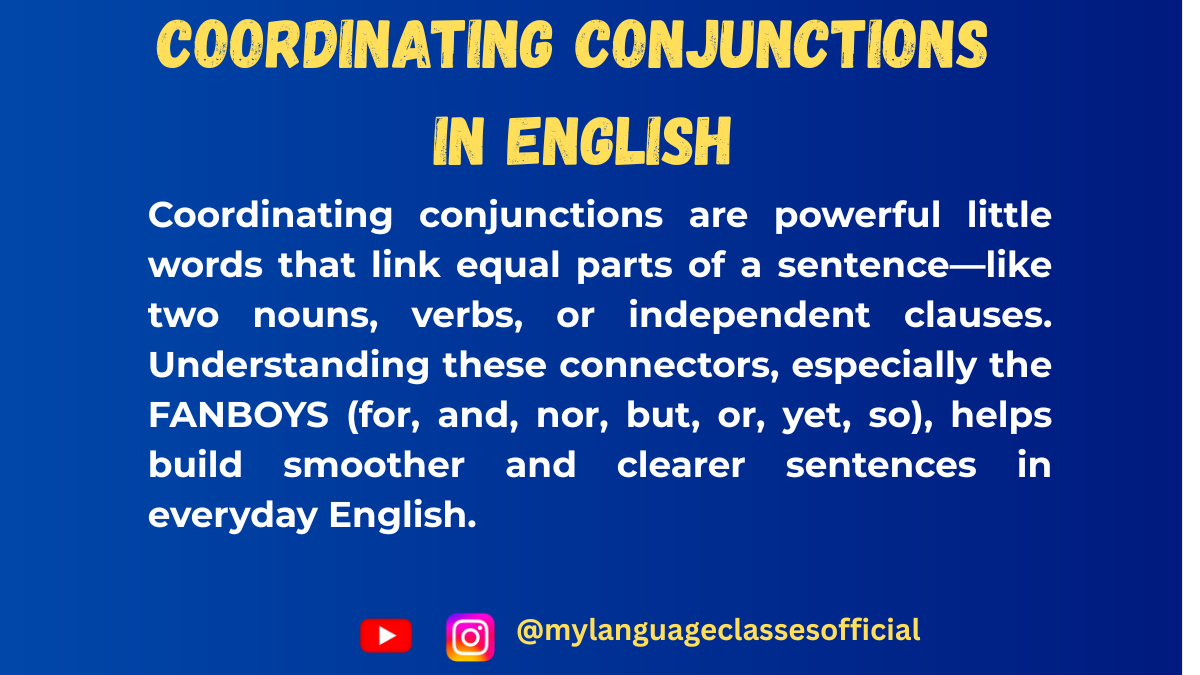
Coordinating Conjunctions in English
Coordinating conjunctions are the glue that holds sentences together. They connect words, phrases, and clauses of equal importance, making your writing and speech more fluid and coherent. Whether you’re a native English speaker or a learner, understanding how to use coordinating conjunctions effectively is essential for clear communication.
In this blog post, we’ll explore the usage of coordinating conjunctions in every possible situation, provide examples, and even test your knowledge with fill-in-the-blank exercises.
What Are Coordinating Conjunctions?
Coordinating conjunctions are words that join two or more elements of equal grammatical rank. The most common coordinating conjunctions are FANBOYS: For, And, Nor, But, Or, Yet, So. These conjunctions are used to connect words, phrases, or independent clauses.
When and How to Use Coordinating Conjunctions
Coordinating conjunctions are used in various situations to connect ideas, show relationships, and create smooth transitions in sentences. Below is a list of situations where each coordinating conjunction is used:
- For:
- Used to indicate reason or cause.
- Example: She stayed home, for she was feeling ill.
- And:
- Used to add information or join similar ideas.
- Example: I love tea, and I enjoy coffee.
- Nor:
- Used to add a negative idea or join two negative clauses.
- Example: He doesn’t like apples, nor does he like pears.
- But:
- Used to show contrast or opposition between ideas.
- Example: I wanted to go, but it started raining.
- Or:
- Used to present alternatives or choices.
- Example: Would you like tea or coffee?
- Yet:
- Used to show contrast or introduce an unexpected result.
- Example: She’s young, yet she’s very wise.
- So:
- Used to indicate a result or consequence.
- Example: It was raining, so we stayed indoors.
List of Coordinating Conjunctions with Examples
Here’s a table of all the coordinating conjunctions along with two example sentences for each:
Conjunction Usage Example 1 Example 2 For Indicates reason or cause She stayed home, for she was feeling ill. He bought flowers, for it was her birthday. And Adds information I love tea, and I enjoy coffee. She sings, and she dances beautifully. Nor Adds a negative idea He doesn’t like apples, nor does he like pears. She didn’t call, nor did she text. But Shows contrast I wanted to go, but it started raining. He’s smart, but he’s lazy. Or Presents alternatives Would you like tea or coffee? You can stay here, or you can leave. Yet Shows contrast or exception She’s young, yet she’s very wise. He’s rich, yet he’s unhappy. So Indicates result or consequence It was raining, so we stayed indoors. She studied hard, so she passed the exam.
More Example Sentences
Here are 10 additional examples to help you understand how coordinating conjunctions work in different contexts:
- I wanted to go to the park, but it was too crowded.
- She didn’t like the movie, nor did her friends.
- You can have cake, or you can have ice cream.
- He’s not only intelligent, but also very kind.
- She was tired, yet she continued working.
- I love pizza, and I love pasta.
- He didn’t study, so he failed the test.
- She bought a new dress, for she had a party to attend.
- They didn’t call, nor did they send a message.
- He’s allergic to cats, yet he adopted one.
Fill-in-the-Blanks Questions
Test your knowledge with these 10 fill-in-the-blank questions. Choose the correct coordinating conjunction from the list: For, And, Nor, But, Or, Yet, So.
- She wanted to go to the beach, _____ it started raining.
- He didn’t like the soup, _____ did he eat the bread.
- You can take the bus, _____ you can walk to the station.
- She was tired, _____ she finished her homework.
- I love reading books, _____ I enjoy watching movies.
- He didn’t study for the test, _____ he failed.
- She bought a new car, _____ her old one broke down.
- He’s not only a great singer, _____ also a talented dancer.
- Would you like tea, _____ would you prefer coffee?
- She’s very busy, _____ she always makes time for her family.
Answers to Fill-in-the-Blanks
- but
- nor
- or
- yet
- and
- so
- for
- but
- or
- yet
Things to Keep in Mind
- Equal Importance: Coordinating conjunctions connect elements of equal grammatical rank (e.g., two nouns, two phrases, or two independent clauses).
- Comma Usage: Use a comma before a coordinating conjunction when joining two independent clauses.
- Example: I wanted to go, but it was too late.
- Avoid Overuse: Don’t overuse coordinating conjunctions, as it can make your writing repetitive.
- Gender Neutrality: Coordinating conjunctions are gender-neutral and can be used in any context.
- Articles: Articles (a, an, the) are not affected by coordinating conjunctions. Use them as needed.
- Example: She bought a book and a pen.
Conclusion
Coordinating conjunctions are a fundamental part of English grammar. They help you connect ideas, present alternatives, and show relationships between words, phrases, and clauses. By mastering the use of FANBOYS, you can improve your writing and speaking skills significantly. Remember to practice regularly and pay attention to the nuances of each conjunction.
If you enjoyed this lesson, be sure to check out more posts like this on my blog at My Language Classes. Don’t forget to subscribe my YouTube channel and follow me on Instagram for the latest language learning tips and lessons. Leave a comment below to share your thoughts, or ask any questions you have about nouns.
Happy learning! 😊
- For:
-
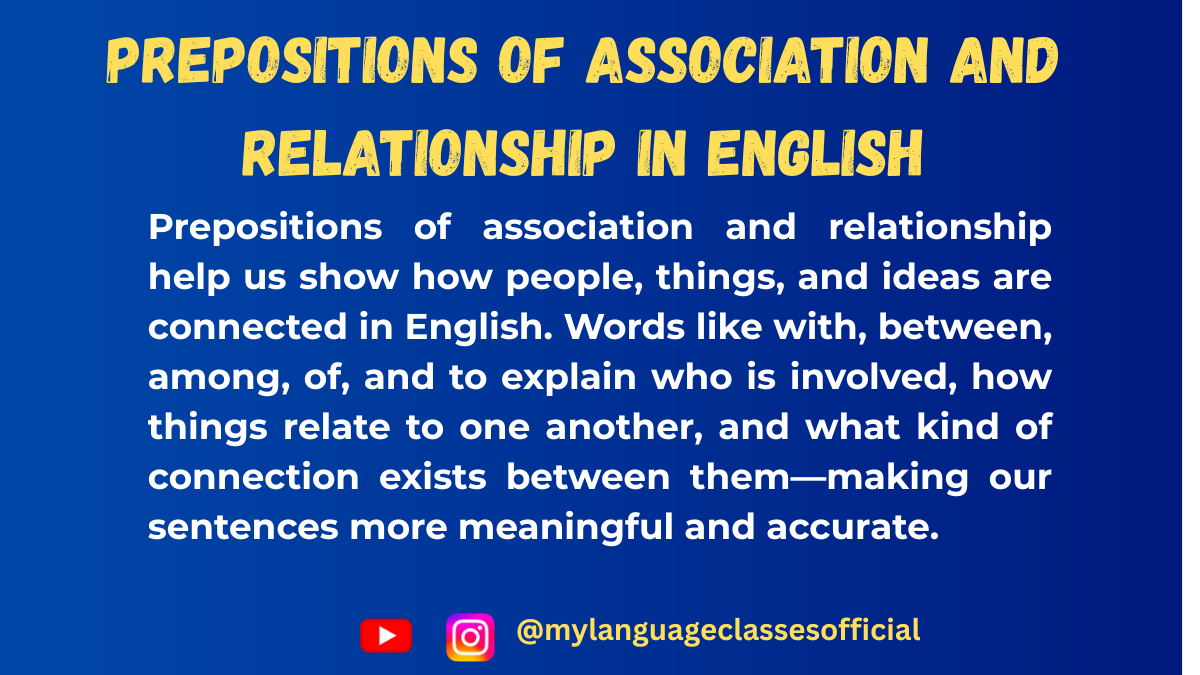
Preposition of Association and Relationship in English
Prepositions are small but mighty words that play a crucial role in connecting ideas and providing context in sentences. Among the various types of prepositions, Prepositions of Association and Relationship are particularly important because they help us describe how people, things, or ideas are connected. In this blog post, we’ll explore the usage of these prepositions in detail, provide examples, and offer practical exercises to help you master them.
What Are Prepositions of Association and Relationship?
Prepositions of Association and Relationship are used to indicate a connection or relationship between two or more entities. These prepositions help clarify how people, objects, or concepts are linked, whether through partnership, belonging, or interaction.
Usage of Prepositions of Association and Relationship
These prepositions are used in various contexts, including:
- Partnerships and Collaborations: To describe working or being together.
- Example: She works with a team of experts.
- Ownership or Belonging: To show possession or association.
- Example: This is the book of my friend.
- Relationships Between People: To describe familial, romantic, or social connections.
- Example: He is married to Sarah.
- Connections Between Objects or Ideas: To explain how things are related.
- Example: The key to success is hard work.
- Membership or Inclusion: To indicate being part of a group.
- Example: She is a member of the club.
- Origin or Source: To show where something or someone comes from.
- Example: This gift is from my grandmother.
List of Prepositions of Association and Relationship
Here’s a table of common prepositions of association and relationship, along with example sentences:
Preposition Example Sentences With 1. She went to the party with her friends.
2. He is collaborating with a renowned scientist.Of 1. The color of the sky is blue.
2. This is a picture of my family.To 1. She is married to a doctor.
2. The answer to the question is simple.From 1. This letter is from my teacher.
2. He hails from a small village.For 1. This gift is for you.
2. She has a deep love for animals.About 1. They were talking about the project.
2. This book is about ancient history.Among 1. The secret was shared among friends.
2. She was among the top performers.Between 1. The agreement between the two companies was signed.
2. The conversation between them was intense.By 1. The book was written by a famous author.
2. The painting was created by an artist.Against 1. She leaned against the wall.
2. The decision was against his wishes.
More Example Sentences
- She is always with her best friend.
- The sound of the waves is soothing.
- He is loyal to his team.
- This recipe is from my grandmother.
- I bought a gift for my sister.
- They were arguing about the rules.
- The prize was divided among the winners.
- There is a strong bond between the twins.
- The song was composed by a talented musician.
- The protest was against the new policy.
Fill in the Blanks
Test your understanding by filling in the blanks with the correct preposition of association and relationship:
- She is traveling ___ her colleagues.
- This is a photo ___ my childhood.
- He is always kind ___ animals.
- The letter was ___ the manager.
- The discussion was ___ the new project.
- The cake was shared ___ the children.
- The agreement ___ the two parties was finalized.
- The novel was written ___ a famous author.
- She stood ___ the door, waiting for him.
- The decision was ___ his will.
Answers to Fill in the Blanks
- with
- of
- to
- from
- about
- among
- between
- by
- against
- against
Things to Keep in Mind
- Articles and Gender: Prepositions of association and relationship are not affected by gender or articles. They remain the same regardless of whether the noun is masculine, feminine, singular, or plural.
- Example: with the boy, with the girl, with the books.
- Context Matters: The choice of preposition depends on the context of the sentence. For example, with is used for companionship, while of is used for possession.
- Avoid Overusing Prepositions: While prepositions are essential, overusing them can make sentences clunky. Ensure each preposition adds value to the sentence.
- Practice Regularly: The more you practice, the more natural using these prepositions will become.
Conclusion
Prepositions of Association and Relationship are indispensable tools for expressing connections and relationships in English. By understanding their usage and practicing regularly, you can enhance your communication skills and write or speak more effectively. Remember to pay attention to context and keep practicing with examples and exercises.
If you enjoyed this lesson, be sure to check out more posts like this on my blog at My Language Classes. Don’t forget to subscribe my YouTube channel and follow me on Instagram for the latest language learning tips and lessons. Leave a comment below to share your thoughts, or ask any questions you have about nouns.
Happy learning! 😊
- Partnerships and Collaborations: To describe working or being together.
-
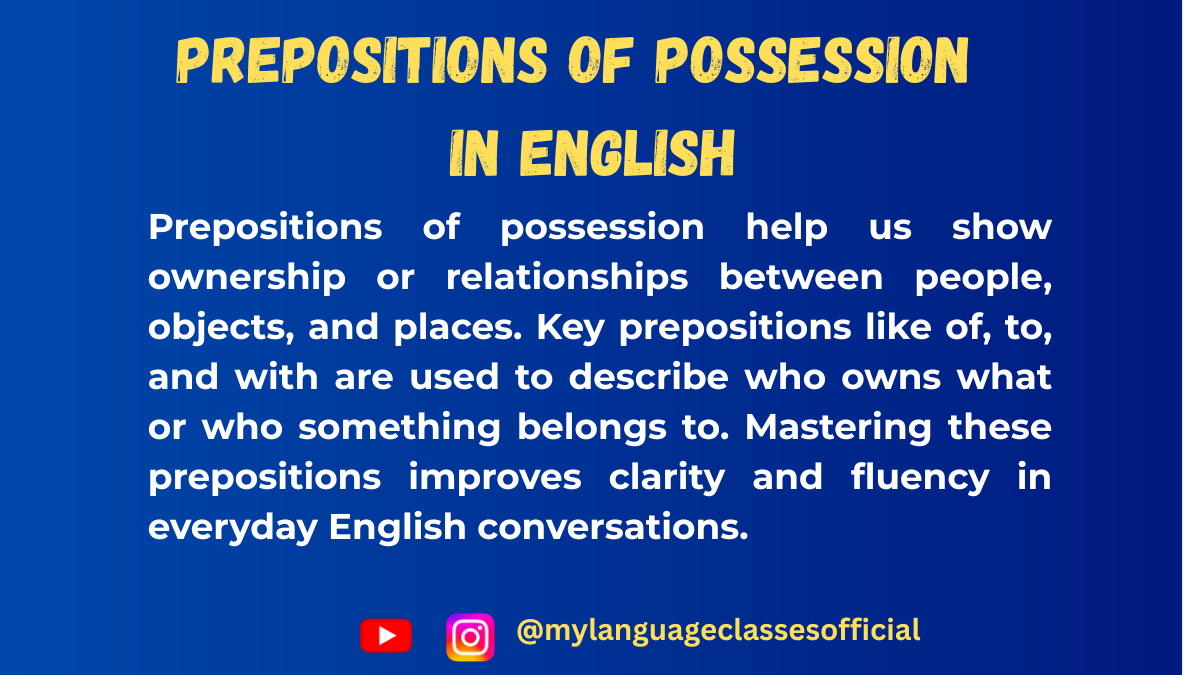
Prepositions of Possession in English
Prepositions of possession are words that indicate ownership, relationship, or belonging. They show how something or someone is related to another person or thing. In this blog post, we will discuss prepositions of possession in detail, their different usages, and provide numerous examples to help you master their application.
List of Prepositions of Possession
Below is a list of prepositions of possession along with their meanings and example sentences:
Preposition Meaning Example Sentence 1 Example Sentence 2 Of Indicates belonging or relation The pages of the book are torn. She is a friend of mine. To Shows possession, especially relationships This pen belongs to me. The key to the door is lost. With Indicates possession through an attribute or characteristic The boy with blue eyes is my cousin. She is the one with the golden necklace. By Can show authorship or ownership This novel is written by J.K. Rowling. The house by the river is beautiful. From Sometimes used to show possession or origin This advice came from my father. The letter from John is on the table. In Can indicate possession in certain contexts The error in the report must be corrected. There is wisdom in his words. For Can imply possession or association This gift is for my mother. The medal for bravery was awarded to him. About Sometimes used to indicate possession or relation The book about Shakespeare is very informative. There is a rumor about the new manager.
Situations Where Prepositions of Possession Are Used
- Indicating Ownership:
- Example: The cover of the book is blue.
- Describing Relationships:
- Example: He is a friend of mine.
- Attributing Characteristics:
- Example: The girl with curly hair is my sister.
- Denoting Authorship:
- Example: The poem by Robert Frost is inspiring.
- Showing Source or Origin:
- Example: The idea from our teacher was brilliant.
- Expressing Purpose or Benefit:
- Example: The scholarship for international students is available.
- Connecting Items with a Relationship:
- Example: The door to the basement is locked.
- Discussing Characteristics:
- Example: The car with tinted windows looks stylish.
- Using Articles with Prepositions of Possession:
- Example: A book of knowledge is valuable.
- Considering Gender in Possession:
- Example: The daughter of the king is the princess.
More Example Sentences
- The rules of the game are easy to understand.
- The key to my house is missing.
- She is the woman with the red umbrella.
- The novel by Charles Dickens is a classic.
- The letter from my mother made me emotional.
- The decision in the meeting was unanimous.
- The gift for my sister arrived today.
- There is a rumor about the new project.
- The map of the city is detailed.
- The teacher with a kind heart always helps students.
Fill in the Blanks
- The color ___ the car is red.
- The necklace ___ diamonds is expensive.
- The painting ___ Leonardo da Vinci is famous.
- This letter is ___ my best friend.
- The answer ___ the question is correct.
- The story ___ Harry Potter is interesting.
- The dog ___ the brown spots is friendly.
- The scholarship ___ outstanding students is competitive.
- The door ___ the balcony is open.
- The sound ___ the guitar is soothing.
Answers
- of
- with
- by
- from
- to
- about
- with
- for
- to
- of
Things to Keep in Mind
- Context Matters: The same preposition can have different meanings in different sentences.
- Articles (a, an, the): These should be used correctly with prepositions of possession.
- Gender Awareness: When referring to possession related to people, gender-specific words like his, her, or their may be necessary.
- Fixed Expressions: Some prepositions of possession appear in fixed expressions, like a friend of mine.
- Word Order: Ensure proper sentence structure when using prepositions of possession.
Conclusion
Mastering prepositions of possession is essential for fluency in English. They help establish relationships between people, objects, and ideas. By understanding their different uses and practicing with examples, you can use them naturally in conversations and writing. Keep practicing, and soon, using prepositions of possession will become second nature!
If you enjoyed this lesson, be sure to check out more posts like this on my blog at My Language Classes. Don’t forget to subscribe my YouTube channel and follow me on Instagram for the latest language learning tips and lessons. Leave a comment below to share your thoughts, or ask any questions you have about nouns.
Happy learning! 😊
- Indicating Ownership:

